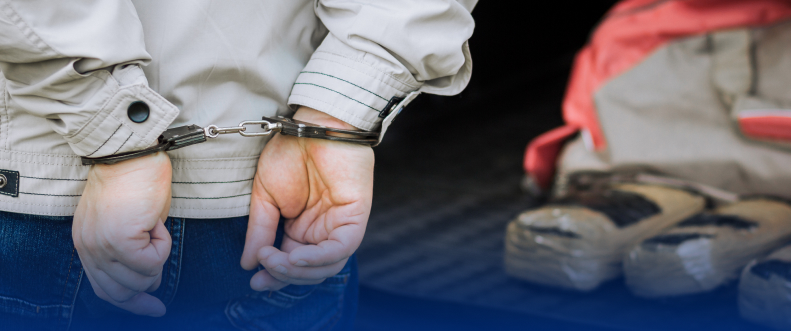
Have you been arrested on suspicion of drug-related crimes in New Jersey? If convicted, you could face serious repercussions such as incarceration, steep fines, license suspension, and more. The consequences of a drug crime conviction can follow you for the rest of your life. That’s why it is so important to get a skilled Middletown drug crime lawyer on your side from the very start.
At Keith Oliver Criminal Law, our trusted defense attorneys have years of experience fighting for people who have been accused of drug crimes in Monmouth, Mercer, and Somerset counties. Contact us today to discuss the details of your case in a free and confidential consultation.
How Can Our Middletown Drug Crime Attorneys Make a Difference for You?
Never try to negotiate a case on your own or accept a plea deal without talking to a trusted drug crime defense attorney. No matter how tough the prosecution is acting, the truth is there are weaknesses in every case, and there will be many opportunities to fight the charges against you. At Keith Oliver Criminal Law, we will help by:
- Explaining the charges you’re facing and what you can expect – One of the most upsetting aspects of facing drug crime charges is not knowing what could happen next. We can help you understand the severity of the charges against you, the potential penalties, and the steps in the legal process, so you never feel blindsided.
- Fighting at every opportunity to have your charges reduced or dismissed – We can review every detail of the prosecution’s case to identify weaknesses and potential issues. In many drug crime cases, we are able to get the charges reduced or dropped.
- Developing a strong defense on your behalf – We can help you obtain evidence to support an alibi, interview witnesses who can testify on your behalf, and work with experts to develop a strong defense to the prosecution’s case.
- Exploring rehabilitation as an alternative – If you are a nonviolent, first-time offender, you may qualify for a special diversion program as an alternative to traditional penalties. For example, you could participate in a supervised probation and treatment program or a pretrial intervention (PTI) rehabilitation program.
- Pursuing the best possible outcome for you – Even if a conviction is unavoidable, our team will negotiate for the minimum possible sentence to mitigate the impact on your life and your family.
Do not wait to get the legal advice you need after an arrest. Contact Keith Oliver Criminal Law now for a free and confidential consultation.
Common Types of Drug Crime Cases We Handle
At Keith Oliver Criminal Law, our Middletown drug defense attorneys frequently handle cases involving the following types of offenses:
- Drug possession – Drug possession involves knowingly or purposely obtaining or possessing a controlled substance without a valid prescription or authorization. This includes both having a controlled substance on your person or having “constructive” possession, which refers to having access to the substance even though it was not on your person when you were arrested.
- Drug distribution – Drug distribution, also known as possession with intent to distribute, involves knowingly possessing or having access to controlled substances with the intent to sell or distribute them. Proving intent to distribute can be difficult, so prosecutors typically look for indicators of intent, such as large quantities of the substance, large amounts of money, drug packaging materials, or evidence of communication with drug buyers.
- Drug use or being under the influence – Using or being under the influence of a controlled substance without a prescription or legal authorization is considered a disorderly person’s offense in New Jersey.
- Drug paraphernalia – Drug possession laws also prohibit the possession of drug paraphernalia, which is defined as anything designed to manufacture a controlled substance or introduce it to the human body. This includes items such as pipes, hypodermic needles, miniature spoons, and equipment used to make or extract controlled substances.
- Drug trafficking – Drug trafficking offenses are based on the weight of the controlled substances in your possession, whether or not there is evidence of your intent to move the drugs. If you have possession of particularly large amounts of controlled substances, you could face second-degree or even first-degree felony charges.
Penalties from Drug Crime Convictions
The penalties for various drug crimes in New Jersey can vary significantly depending on the type of drug, the quantity of the substance, and the type of offense. For example, penalties for the possession of various types of drugs are as follows:
- Possession of marijuana – Under New Jersey’s Medicinal Marijuana Program (MMP), eligible patients and caregivers can possess up to two ounces of medical marijuana. If you do not have an MMP prescription, possession of 50 grams or less of marijuana or 5 grams or less of hashish is a disorderly person’s offense punishable by up to $1,000 in fines and six months in jail. Possession of more than 50 grams of marijuana or more than 5 grams of hashish is a fourth-degree offense punishable by up to $25,000 in fines and 18 months in jail.
- Possession of any other drugs listed in Schedules I-IV – Possession of heroin, cocaine, methamphetamine, and all other Schedule I-IV drugs, including unauthorized prescription drugs, is treated differently from marijuana possession. This type of possession is a third-degree offense punishable by up to $35,000 in fines and three to five years in jail.
- Possession of Schedule V drugs – Unauthorized possession of Schedule V drugs is a fourth-degree offense punishable by up to $25,000 in fines and 18 months in jail.
- Possession of drug paraphernalia – Paraphernalia possession is a disorderly persons offense punishable by up to $1,000 in fines and six months in jail.
In addition to fines and possible jail time, penalties for a drug crime conviction may include the suspension of your driver’s license and the police seizure of your vehicle.
If you happen to be arrested while in possession of large quantities of controlled substances, prosecutors may interpret this as evidence of possession with intent to distribute. The penalties for possession with intent to distribute vary for different substances but tend to be significantly harsher than penalties for simple possession.
After an arrest, your first call should be to a knowledgeable drug possession lawyer. At Keith Oliver Criminal Law, we can help you understand the charges you are facing and fight for what’s best for you.
Understanding New Jersey Drug Laws
Like all states, New Jersey has controlled substances laws that categorize drugs into different “schedules” based on their potential for abuse, accepted medical uses, and other risk factors. The various schedules of controlled substances include:
- Schedule I drugs – Schedule I drugs are substances with a high potential for abuse and no currently accepted medical uses. Examples of Schedule I drugs include certain opiates, heroin and certain other narcotics, and hallucinogens such as MDMA, LSD, and psilocybin. Note that marijuana is currently listed as a Schedule I drug, although it is treated differently from other Schedule I substances under the law.
- Schedule II drugs – Schedule II drugs have a high potential for abuse but also have currently accepted medical uses. Examples of Schedule II drugs include opium and certain opiate derivatives, cocaine, fentanyl, and methadone.
- Schedule III drugs – Schedule III drugs have less potential for abuse than Schedule II drugs and have currently accepted medical uses. Examples of Schedule III drugs include amphetamines, amphetamine salts, methamphetamine, barbiturates, PCP, ketamine, and prescription drugs containing moderate doses of codeine and morphine.
- Schedule IV drugs – Schedule IV drugs have a low potential for abuse and have currently accepted medical uses. Examples of Schedule IV drugs include barbital, phenobarbital, and certain drugs that act as depressants on the central nervous system.
- Schedule V drugs – Schedule V drugs have the lowest potential for abuse among controlled substances as well as currently accepted medical uses. Examples of Schedule V drugs include prescription drugs with low doses of substances like codeine, opium, and opium salts.
Common Defenses to Drug Charges
When the attorneys of Keith Oliver Criminal Law handle New Jersey drug crimes cases, we often are able to get charges reduced or even dismissed entirely by using the following defense arguments:
- The prosecution’s evidence was obtained through an illegal search and seizure.
- The prosecution cannot prove that the drugs in question were in the defendant’s possession or under their control.
- The prosecution cannot prove that the substances seized by law enforcement are actually controlled substances.
- Law enforcement officers did not have sufficient probable cause to search the defendant or their vehicle or home.
- Law enforcement officers identified the defendant as a suspect using flawed or misleading procedures, such as a poorly executed lineup.
- Law enforcement officers detained or arrested the defendant based solely on a protected characteristic, such as race or ethnicity.
- Law enforcement officers failed to advise the defendant of their Miranda rights promptly upon arrest.
- There is evidence that defective lab equipment or improper testing procedures were used to obtain positive drug test results.
Protecting Your Rights During and After a Drug Arrest
Being arrested for drug crimes can be a frightening and stressful experience, and the actions you take can have a big impact on your case. You can protect your rights during and after the arrest by:
- Remaining calm and refraining from any actions or statements that could be interpreted as resisting the arrest
- Politely explaining that you intend to exercise your Fifth Amendment rights rather than providing potentially incriminating answers to any police questions
- Making note of the names, badge numbers, and conduct of any law enforcement officers involved in the arrest
- Asking to speak with a criminal defense attorney as soon as possible and refusing to discuss your case with anyone but your lawyer
- Refraining from sharing details about what’s happened on social media while your case is being resolved

